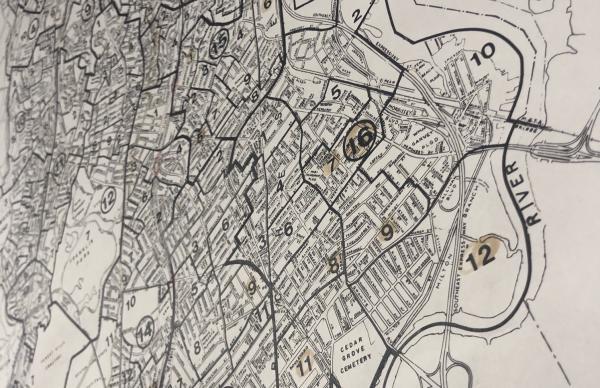October 19, 2021

A ward and precinct map of the City of Boston shows the three impacted Ward 16 precincts, bottom right. Reporter file photo
Lawmakers in charge of redrawing political boundaries across the state on Tuesday dropped a plan to break up a section of Dorchester in the Senate.
The move came after local groups raised the possibility of legal action and labor unions with a heavy presence in the area waded into the debate that occurred in the wake of the decennial US Census.
A redrawing of the boundaries of the state’s legislative and Congressional districts happens after every federal census report. Districts include wards, which are further broken down into precincts.
Sen. William Brownsberger, a Belmont Democrat who co-chairs the Legislature’s redistricting committee, said that three precincts from Ward 16 that had been reassigned to a suburban Senate district in a draft proposal had been restored to the First Suffolk Senate district, which is represented by Nick Collins of South Boston.
The earlier map called for the breaking up of Dorchester’s Ward 16 as a Senate district by placing the three precincts — 16-9, 16-10, and 16-12, which are in the Adams Corner, Neponset, and Port Norfolk neighborhoods — in a district that includes Avon, Canton, Randolph, Stoughton, and parts of Braintree and is represented by Sen. Walter Timilty of Milton. The three precincts are also among Dorchester’s most conservative voting areas.
Brownsberger said he took a run through the area last Sunday – from Broadway in South Boston through Dorchester, over into Milton, and then back up Adams Street to Dorchester – and took notice of the change in the landscape between the two districts.
Earlier as the first draft was up for consideration, he had defended the proposal, saying that it wasn’t uncommon for wards to be broken up, including in his own district.
Said state Rep. Dan Hunt, who as chair of the Ward16 Democratic Committee raised the prospect of legal action if the three precincts were shifted into a suburban district: “I thank greatly the committee and Senator Brownsberger for their hard work throughout the whole process. The public can see that the process prevailed.”
The public comment period on the map closed on Monday of this week.
Collins had also weighed in, noting that since the draft map was released, local leaders and unions had been united in opposition to moving the precincts to a suburban Senate district.
Labor unions’ entry in opposition marked a rare instance in which unions are involving themselves in the process of redistricting. The Boston Carmen’s Union, which represents MBTA employees, said Ward 16 should be kept whole in order for the Senate district to remain a “labor-friendly” seat. In a letter to lawmakers, Jim Evers, the union president, said the draft map “dramatically weakens the voice” of 1,000 union members who live in Collins’s district, which is otherwise known as the First Suffolk Senate district.
“As urban residents, they are faced with different challenges day to day than those of suburban residents,” he wrote. “In addition to ensuring that their needs are represented by someone who understands those issues, we are also concerned about watering down the voice of labor in the 1st Suffolk district.”
Boston Firefighters Local 718, whose headquarters are in one of the precincts, also decried the proposed change.
“As a labor organization, Local 718 doesn’t usually weigh in on matters like redistricting,” the union’s legislative agents wrote in their letter. “But given that this matter affects a large percentage of our membership, we believed it was prudent to weigh in.”
David Holway, the president of the National Association of Government Employees, sent his own opposition letter, noting that his union has 1,000 members in the First Suffolk district.
The three civic groups representing the affected neighborhoods — Cedar Grove, Pope’s Hill and Port Norfolk — also oppose the proposal.
McKeon Post No. 146, which is located on Hill Top Street, is another organization that put its opposition to paper in a letter to lawmakers that was signed by past commanders and current executive board members of the post, which calls itself one of the largest veterans organizations in Boston.
Like Hunt, they said they would have considered legal action if the proposal went forward.
“The vast majority of our members were born in the city, educated in the city, left the city to join the military and then returned to the city to raise their families,” the letter said.
The letter said the proposed map “may be well intentioned” but it “constitutes a serious disservice to our veteran members and their families whose voices need to be heard at the State House and not watered down.”
State lawmakers are facing a tight timeline to finalize the maps. They are reportedly aiming for Nov. 8 this year, due to House lawmakers being required to live within their district boundaries for at least one year before an election. State senators just have to be residents when elected.
Material from State House News Service was used in this report. This post was updated with news of Senate lawmakers withdrawing their plan to split up Ward 16.


